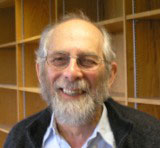
For Release: September 3, 2010
Contact:
David Corriveau, Media-Relations Officer, Dartmouth-Hitchcock Medical Center, Dartmouth Medical School, at david.a.corriveau@hitchcock.org or 603-653-1978.
New DMS Center to Focus on Radiation Exposure

Harold M. Swartz, M.D., Ph.D.
Lebanon, N.H.—Researchers at Dartmouth Medical School (DMS) are taking a major step in developing tools to assess radiation injuries in survivors of radiological or nuclear catastrophes, including terror attacks.
With a $16.6 million grant from the National Institutes of Health (NIH), DMS's new Biodosimetry Center for Medical Countermeasures against Radiation (Dart-Dose CMCR) will, over the next five years, lead a consortium of four institutions in developing portable devices that use electron paramagnetic resonance (EPR) to measure exposure to radiation.
Under the direction of Harold M. Swartz, M.D., Ph.D., and as part of an interactive collaboration sponsored by NIH's National Institute of Allergy and Infectious Diseases (NIAID), the Dartmouth program - formally titled "Physically-Based Biodosimetry for Triage after a Large Radiation Incident" - becomes one of only seven NIH/NIAID-funded Centers for Medical Countermeasures against Radiation (CMCRs). Each center will focus on one or more aspects of medical response to a large-scale incident, including assessment of exposure, drugs for treatment of radiation injury, and methods for removing radioactive materials from the body. The Dartmouth center will refine and further develop biodosimetry devices that allow non-specialists in the field to use EPR in measuring radiation levels in the teeth and nails of survivors.
"It is unlikely that there can be an effective medical response to an event in which large numbers of individuals are potentially exposed to clinically significant levels of radiation without a means such as biodosimetry to determine the exposure level," says Swartz, a DMS professor of radiology, radiation oncology, physiology, and community and family medicine. "The efficient employment of medical resources, prompt and effective treatment of exposed individuals, and the optimum use of radiation mitigaters require knowledge of the dose an individual has received. Our team will develop the initial field-deployable prototypes based on the advances of our existing techniques, hardware, and software for making measurements in laboratory and clinical settings."
Since 2005, Swartz and his colleagues at Dartmouth's EPR Center, have been developing, improving, and testing EPR techniques with the support of NIAID, as part of one of the initial CMCR Centers. On August 19, 2010, NIAID announced the funding of the second round of CMCRs, this time with DMS as its own center devoted to physical biodosimetry. Other CMCRs receiving NIAID support are at Columbia University, the Albert Einstein College of Medicine, Duke University, the University of California-Los Angeles, the University of Pittsburgh Medical Center, and the University of Rochester (N.Y.) Medical Center.
Swartz pioneered research in this field (see the articles here, here, and here) during his tenure with the Army medical corps in the 1960s. In a 1968 paper, he showed that EPR could measure radiation exposure through the teeth of patients and, potentially, in their fingernails. He continued his research at the Medical College of Wisconsin and at the University of Illinois at Urbana-Champaign before coming to Dartmouth in 1992.
The CMCRs are part of NIAID's larger program of medical countermeasures, which NIAID director Anthony S. Fauci, M.D., describes as "vital to protecting the public and caring for patients in the event of a deliberate or accidental exposure to radiation. Such treatments also might help diminish the organ and tissue damage that occurs after radiation exposure in other settings, such as in cancer therapy."
In addition to continuing its research, the new CMCR at Dartmouth will annually support up to 10 pilot studies, at $50,000 each, for research that complements the Dart-Dose theme of physical biodosimetry and other studies relevant to the overall mission of the CMCRs.
"We'll be a funding source," Swartz says. "With this funding, we're able to bring in a lot of other expertise to complement what we're doing."
For more information about the national CMCR program, contact Julie Wu at 301-402-1663 or at niaidnews@niaid.nih.gov.
-DMS-